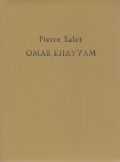Larger hopes and the new hedonism: Tennyson and FitzGerald. Norman Page.
In: Edward FitzGerald’s The Rubáiyát of Omar Khayyám. Ed. by H. Bloom. Philadelphia, Chelsea House, 2004. p. 151-168.
(From Tennyson: Seven Essays, edited by Philip Collins. 1992 by The Macmillan Press Ltd.)
Page compares Tennyson’s In Memoriam with the almost contemporary Rubaiyat. The author’s analysis is that, even as he confronts the threats to faith posed by the new science (Darwin), Tennyson remains conservative and reassuring with the strength of his convictions, while the Rubaiyat, a fin-de-siecle poem “born before its time”, is uncompromisingly unorthodox and challenging with the power of its scepticism.
